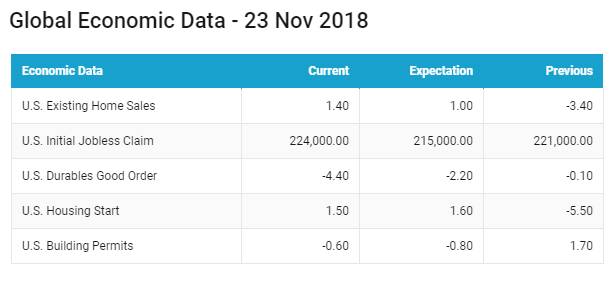The Indian Rupee strengthened above the Rs 71 per USD mark on Thursday for the first time after a gap of two-and-a-half months, as crude oil prices continued to fall. The gain in INR is a significant improvement over the all-time low of Rs 74.4 in the second week of October. Oil prices have slumped to its lowest point this year, as concerns mount about a glut of crude supply and fears that economic headwinds couldweaken demand. Brent crude oil prices fell by 12% last week and is currently trading at levels of USD 58.8 per barrel. Indian Rupee appreciated by 1.74% against the USD last week and appreciated by 1.02% against the euro.
USD ended the week higher despite uncertainty over the pace of future U.S. interest rate hikes after many Fed officials turned less hawkish as they see global growth slowing. However, the gain for the USD last week was largely driven by the fall in euro and pound. Euro came under pressure last week after signs of weaker eurozone economic growth emerged. The pound came under pressure after news that Spain and the UK have not reached a deal on Gibraltar. USD Index (DXY), which tracks the movement of the USD against six major currencies, rose by 0.47% on a week on week basis and is at a level of 96.92.
USD started the week on a lower note adding to Friday’s losses, after dovish comments by Federal Reserve Vice Chair Richard Clarida, who said he saw some evidence that global growth is slowing. USD was also under additional pressure after U.S.-China relations soured over the weekend as leaders of the Asia-Pacific Economic Cooperation (APEC) failed to agree on a communiqué for the first time in history.
Papua New Guinea Prime Minister Peter O’Neill, who was chairman of the meeting, said “the two big giants in the room” were the two members of the APEC who could not agree. O’Neill added that Beijing and Washington could not agree on whether “World Trade Organisation and reform of the World Trade Organisation” should be in the Leaders’ Declaration.
Euro depreciated by 0.68% against the USD last week after signs of weaker eurozone economic growth emerged. Business growth in the eurozone slowed this month, as a slowing global economy and an ongoing United States-led trade war weighed down the growth. The sentiment for the euro weakened further after data showed that the German private-sector growth slowed to its lowest level in nearly four years.
British pound depreciated by 0.16% against USD last week. At the start of the week. pound found some support following reports that the European Union’s chief negotiator proposed extending the Brexit transition period for another two years to give the UK and EU more time to complete a trade deal. However, the euro came under pressure on Friday after Spanish reservations over Gibraltar prevented the European Union clearing the last hurdle before the bloc signed off its Brexit deal with Britain.
Weekly Global Bond Market Analysis
US 10-year benchmark bond yields fell by 2 bps, UST yields fell to two-month lows, as falling stock and oil prices increased buying of long end U.S. government bonds. U.S. stocks closed lower in a shortened post-holiday trading session, as the energy sector tumbled on continued weakness in oil prices. US 2-year bond yields closed at 2.81%, down from 2.97% on 8th November (Fed Policy Meeting), as falling stocks and weakening global growth raised doubts whether the U.S. central bank will be able to continue its rate-hike cycle much further without damaging the economy.
Bond yields fell across Europe after lackluster eurozone data. Germany gross domestic product fell by 0.2% in the third quarter, the first negative reading since early 2015. The eurozone composite purchasing manufacturer index for November slipped to 52.4, its lowest in nearly four years. The worsening economic backdrop could complicate the ECB efforts to normalize monetary policy. ECB is expected to announce the end of bond purchases at the next December meeting.
Italy 10-year benchmark bond yields fell by 7 bps following a press report that Italy’s EU Affairs Minister Paolo Savona is considering resigning over the government’s decision to challenge European Union budget rules. Savona is known for his Euroscepticism and markets were cheered by the press report.
Greece 10-year benchmark bond yields fell by 1 bps, Mario Centeno, President of the Eurogroup and Chairman of the Board of Governors of the European Stability Mechanism said the outlook for the Greece economy is positive. The fiscal performance has been outstanding. Recent data suggests that Greece will overshoot its fiscal objectives for the third year in a row, including the primary surplus target of 3.5%.
Spain 10-year benchmark bond yields were flat, Portugal 10-year benchmark bond yields fell by 5 bps.
Emerging economies 10-year benchmark bond yields largely fell last week.
South Africa 10-year benchmark bond yields fell by 17 bps, South African Reserve Bank increased the repurchase rate by 25 basis points to 6.75 percent per annum on Thursday for the first time in two years. South Africa’s repo rate has been at 6.5% since March this year when it was cut by 25 basis points.
Indonesia 10-year benchmark bond yields fell by 16 bps, Indonesia central bank surprisingly raised its benchmark interest rate for the sixth time this year, Bank Indonesia (BI) raised its 7-day reverse repurchase rate by 25 basis points to 6.00%. The key rate has now been hiked 6 times by a total of 175 basis points since May, as BI tried to slow capital outflows triggered by rising U.S. rates and aimed to put a floor under the fragile rupiah.
Australia 10-year benchmark bond yields fell by 3 bps, Brazil 10-year benchmark bond yields fell by 26 bps, China 10-year benchmark bond yields rose by 6 bps.
US high-yield bond yields rose by 20 bps to 7.16% and Eurozone high-yield bond yields rose by 36 bps to 4.36%.

